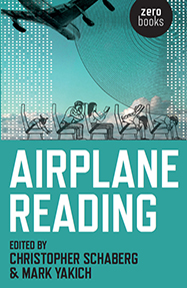In March 2010, I went on a trip from my home in the Netherlands to Brazil. I travelled around a little bit, visited Rio de Janeiro, Foz do Iguaçu and Florianópolis. The favelas, the bread shaped mountains, the waterfalls, the beaches, the butterflies—they all left a deep impression.
On the day of my flight, I got up early to go to the tiny airport at Florianópolis to catch a plane to São Paolo, from where I would fly to Rio. I flew with TAM (the Brazilian airline), and the complimentary chocolates they hand out at the beginning of each flight made me simultaneously happy and irrationally worried that they might hand those out to distract you from worrying about malfunctions. Nothing happened, and I landed safely and on time. I had to wait a couple of hours in Rio. Rio’s airport is one of the most boring ones I have ever been to. I have this thing about airports, though. I love them, no matter how small and low on entertainment or food choice. I love walking around with my headphones on, alone, imagining myself in the music video of the song I’m listening to.
After a couple of hours in line to check in for my flight, I realized something was wrong. The line was long, and there was a woman from TAP (the Portuguese airline) going around asking people something. People were leaving the queue. She got to me, asked me where I was going. I said I was going to Brussels.
There is no flight to Brussels today, she said. Because of the volcano.
I looked at her. Volcano? There is no volcano in Belgium. I thought maybe I’d misunderstood her. My Portuguese wasn’t that good.
Volcano, she said, in English this time. Please go to our office to the right there and ask them for further information.
I then discovered that a volcano had erupted in Iceland, and all the airports north of Spain were closed. I was alone in Rio de Janeiro.
I spent the night in a hotel in the city, ordering room service (courtesy of TAP) and watching the news. The next morning I went to the airport again, asked if the airports were open yet. I knew they weren’t. No, they said, we only fly to Lisbon.
What can I do? I asked. How do I get home? They shrugged.
I decided I would fly to Lisbon, and see where I’d go from there. At least I’d be in Europe. On the news I’d seen video footage of airports in Europe, thousands of stranded people sleeping on benches and on the floor. It actually looked nice, people looked united, sharing the bad luck with a feeling of “being in this together.”
In Rio, not that many people seemed to be in the same situation as I was. I talked to a German guy who was on his first business trip ever. We talked about his job and about the possibilities of getting home. Maybe a train, or buses. His company would take care of it.
On the plane, I sat next to an Indian man. He was in his 40s, and a great storyteller. He told me all about India. When we said goodbye he wished me luck and said he hoped the ash cloud would blow over soon. Thank you, I said. I told him he was one of the most interesting strangers I had ever met and he smiled.
At the Lisbon airport, there was a certain excitement in the air. I went to the TAP office, changed my flight from Brussels to Barcelona. I would take a train from there; plenty of trains depart from Barcelona.
One of the main reasons I love to travel alone is looking out the window of airplanes and trains and buses. I tried to book a train on one of the computers at the airport, but the website kept returning to home page, and I became very frustrated. My mom tried to book from home, but the website was down. I’d figure it out when I got there.
I spoke to many people at the airport. A group of Dutch tourists were quite nice to me. We talked for a while, but then their tour guide rented a bus and they hurriedly said goodbye. So much for the united feeling of “being in this together.”
The Lisbon airport was crowded. I slept for a couple of hours on a very uncomfortable chair, and then boarded the plane to Barcelona. We arrived at night, and at around ten o’clock I got to the train station. I’d met two Dutch women on the way. They talked to me about their trip to Lisbon. It wasn’t very interesting but I listened anyway. They both had children of about my age. They were happy I spoke Spanish.
We got to the counter and I asked for the next train to Paris, or any place north. There are no trains, the clerk said. She was a little annoyed, as she’d probably repeated the same sentence hundreds of times that day. There is a strike in France, she said. There won’t be any trains for a couple of days.
The line from the bus station across the street was enormous, and I felt my spirits sink. The two women called their husbands who’d been able to book a hotel room just in case. They said goodbye. So much for “being in this together.”
Then my dad called. He was having dinner with a colleague, whose parents lived in Barcelona. He’d already called them and they were on their way to pick me up. I ended up spending three days with them, total strangers. For three wonderful days they showed me the city, took me out to dinner, and made me feel at home. It was an experience I still cherish immensely, and for which I can thank the volcano that erupted in Iceland.






